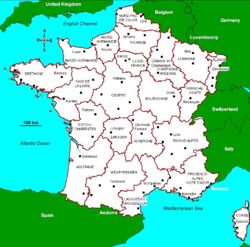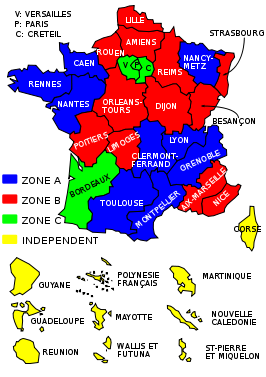Welcome to the Virtual Education Wiki ~ Open Education Wiki
France
by authorname authorsurname
Experts situated in Country
Country in a nutshell
France is a country whose metropolitan territory is located in Western Europe and that also comprises various overseas islands and territories located in other continents. After Russia, France is the largest country in Europe (643,427 km² with its overseas départements). With a population of over 63 million inhabitants, France is the second most populous country in Western Europe (after Germany). Its territory is split into (administrative) regions. 22 of them are in Metropolitan France (the part of the country that is in Europe).
French is the official language of France, but each region has its own unique accent; in addition to French, there are several other languages of France traditionally spoken, although use of these languages has greatly decreased over the past two hundred years. French is also an official language in 41 countries, most of which form what is called in French La Francophonie, the community of French speaking nations.
Education in Country
French educational system is highly centralized, organized, and ramified. It is divided into four different stages:
- Pre-primary education
- primary education (enseignement primaire);
- secondary education (enseignement secondaire);
- higher education (enseignement supérieur).
Education in France From Wikipedia, the free encyclopedia
Pre-primary education
France has a long tradition of ‘pre-elementary’ education. Despite the fact that it is not compulsory, all children attend the école maternelle (nursery school) from the age of 2 to 5, though provision to children aged 2 is based on availability. Public-sector ‘pre-elementary’ or ‘nursery’ schools are the responsibility of the education ministry and attendance at them is free of charge. In the private schools that cater for close to 2.4 % of children, parents pay a share of the tuition fees. Nursery schools are indeed schools in the full sense with programmes of teaching and learning activity. The main educational areas of activity contribute to the overall development of children and prepare them for ‘elementary’ school.
Compulsory education
Education is compulsory between the ages of 6 and 16. It is divided into three stages:
- Primary education (école primaire) Ages 6-11
- Lower secondary education (collège) Ages 11-15
- General and technological lycée (lycée général et technologique) or vocational lycée (lycée professionnel) Compulsory only between ages 15 and 16
The enrolment of pupils in state schooling is based on a ‘sectorial’ principle: pupils are normally registered in the primary school, collège or lycée of the geographical area in which their parents live. State education is free of charge. Private education is mostly Roman Catholic. Although the French constitution proclaims that the state is secular, a 1959 law allows private establishments to sign government contracts that procure financial support in exchange for some control.
The ‘elementary’ school curriculum concentrates on the basic skills of reading, writing and arithmetic, as well as on physical education (normal motor skills, etc.) and enhancing awareness and sensitivity. The lower secondary education curriculum consists of eight or nine compulsory subjects depending on the year of study, and becomes increasingly diversified with the inclusion of optional subjects. Primary school classes have a single teacher for all subjects, whereas secondary school classes have different teachers for each subject. The education ministry determines school curricula and the aims underlying the acquisition of knowledge and skills by pupils. Teachers choose their own teaching methods and school textbooks.
On completion of their collège schooling, pupils are awarded a brevet (national certificate) on the basis of their marks in the final two years and a national examination. The brevet is not a compulsory qualification and continuation of their schooling in a lycée is not dependent on their passing the examination.
Post-compulsory education/upper secondary and post-secondary level
On completion of collège, pupils are offered three educational options:
- general studies;
- technological studies;
- vocational training.
At the lycée d’enseignement général et technologique, which caters for pupils who have chosen either of the first two possibilities, provision lasts three years and leads to the general and technological baccalaureate examination that may be chosen among the three general categories (economic and social, literary, or scientific) or among the seven technological categories. The lycée professionnel prepares students in two years for the first level of vocational qualification, corresponding to the certificat d’aptitude professionnelle (CAP) or brevet d’études professionnelles (BEP). These qualifications are designed to provide direct access to employment including in-company placements or may lead to a vocational baccalaureate in one of 48 specialised fields on offer. The baccalaureate, whether general, technological or vocational, gives access to higher education.
Adapted from : National summary sheets on education systems in Europe and ongoing reforms-2007
Schools in Country
Further and Higher education
Universities in Country
Polytechnics in Country
Colleges in Country
Education reform
Schools
Post-secondary
Administration and finance
Schools
School education comes under the minister responsible for education throughout the country. Free public-sector provision exists alongside education offered by private schools whose population has remained stable for several years, at 2 027 700 (primary and secondary education, 2006).
At the beginning of the 2006/07 academic year, the school population in metropolitan France and its overseas départements (DOM) for public and private sectors stood at 12.4 million students. In order for the education system to operate, the state employs more that 1.3 million people, 850 000 of whom are public sector teachers. There are almost 2.287 million students in higher education, which employs 147 000 people, 88 000 of whom are teachers in public HEIs. The language of instruction is French. The regional languages are taught as part of the modern languages branch of studies.
Notwithstanding certain decentralisation measures under which responsibility for the construction and maintenance of public-sector school buildings has been entrusted to the local area authorities, the central government has retained a decisive role in the area of educational policy. The ministry responsible for national education draws up in detail the curriculum for each subject and level of education, and provides guidelines for teaching without however obliging teachers to adopt a particular method. It administers the recruitment, training and management of teaching staff, determines the status and regulations of schools, allocating them their appropriate quota of staff. The ministry also organises examinations and awards national qualifications, in particular the baccalaureate which testifies to the satisfactory completion of secondary schooling.
In order to implement this policy and the accomplishment of its numerous management tasks, France is divided into 30 such académies each headed by a rector acting directly on behalf of the minister. An académie is the administrative level enabling the regional application of education policies as defined by the government. It allows action to be taken according to local contexts in collaboration with regional groups: communes (town) for primary education, départements (district) for collèges and régions (province) for lycées.
The system is supervised by several inspectorates. Three general inspectorates are entrusted with very broad responsibilities for evaluation at national level in addition to two regional inspectorates, one that visits primary schools and monitor the performance of teachers, and one responsible for marking and assessing school teachers at secondary level.


